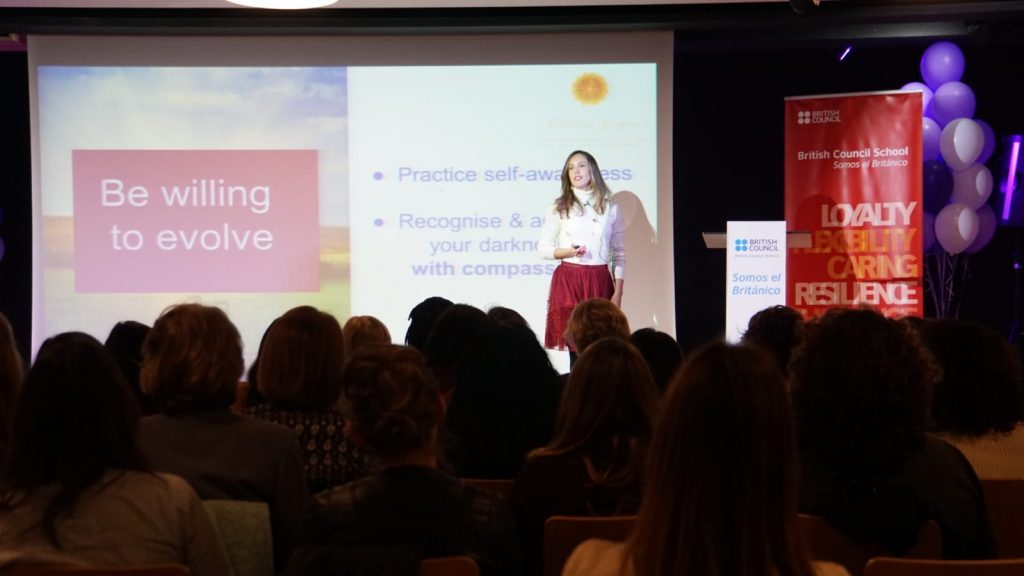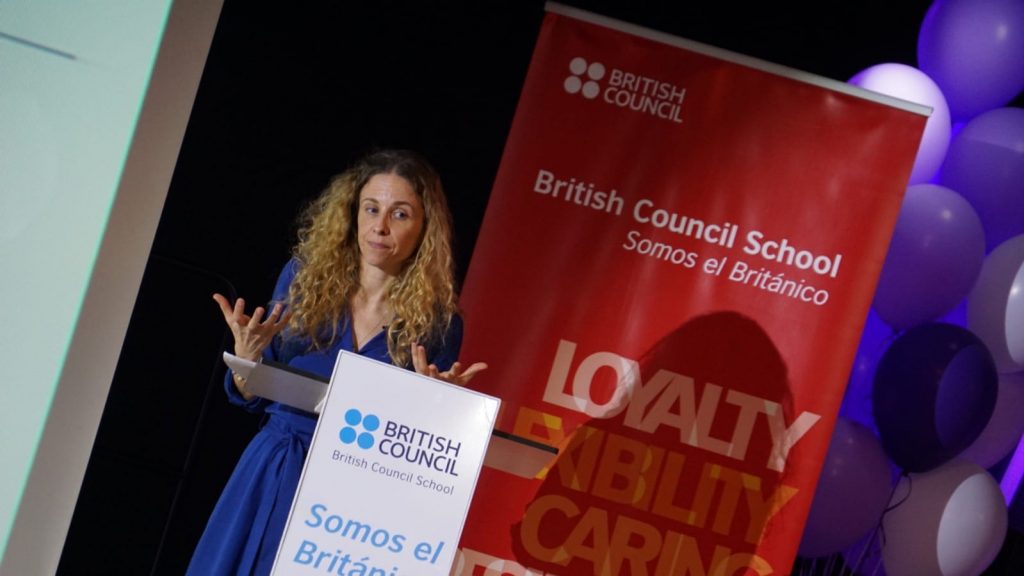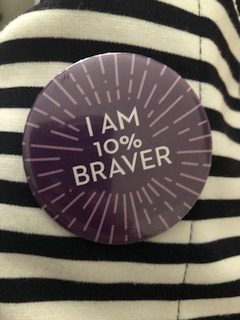This past Saturday morning, despite the best attempts of the Coronavirus, to the fanfare of two female DJs surrounded by 250 purple balloons, a hundred women celebrated the inauguration of the #WomenEdEspaña network at the British Council School in Madrid. This event was the culmination of over three months of planning between myself and Mercedes Hernández Estrada, and her talented team members Nicola Escario Connolly and Teresa Gómez Regidor.
Mercedes and I had started to talk about this back in the summer of 2019, and met for the first time on a chilly Friday afternoon last November. As Head of one of the biggest and most respected bilingual schools in Spain, her calendar is usually packed and our meeting came right at the end of the working day. But we had vowed to make this launch happen, and Mercedes had pulled in the school’s Head of Marketing, Nicola, to ensure that our earlier conversations translated into reality.
As the three of us talked through possible speakers and themes for the event, it became clear that this launch had to serve all possible kinds of schools. I talked about wanting to include universities in the discussion about gender parity in leadership: lecturers and academics face some sobering statistics about pay and flexible working opportunities too. We all felt strongly that this should be an event to signal the openness to collaboration we had wanted to foster in our own school contexts. However as representatives from the international and private school sector in Spain, we knew more had to be done to reach traditional public schools here.
Our context in Spain is, on the surface, more positive than in many other #WomenEd networks. The World Economic Forum Gender Gap report benchmarks 153 countries on gender parity. In 2019, Spain was one of the most-improved countries, in 8th position (79.5%). A closer look at the dataset reveals that this was mainly due to a high representation of women in the government formed in 2018, with women appointed to 11 of 17 cabinet posts. The Spanish congress also became the most gender-equal in the EU last year with 47.4% female representation. However, women on companies’ boards of directors only represent 22% and the overall gender earnings gap stands at 35.7%.
In education, the figures are more stark. According to 2019 figures on equality from the Ministry of Education, 66.5% of teachers in Spain are women, making up 71.9% of non-university teaching posts and 41.3% of university level teaching: yet their representation decreases as the level of teaching goes up. The same thing happens to the percentage of women in leadership roles: the percentage of female primary school heads is 63.3%, falling to 38.4% of secondary school heads, and only 22.5% of senior lectureship positions at universities. There are still challenges caused by factors both internal and external: a lack of knowledge about legal working rights, especially considering part time work and maternity leave or return to work afterwards. Barriers exist for women accessing senior leadership roles in schools and universities, especially if “unseen” duties like childcare and care for elderly relatives are taken into account. Let’s not forget that work culture in Spain can be akin to “hey, you’re lucky to even have a job”, so many people after the economic crisis did not feel they could rock the boat in any way, just to remain employed.
Our challenges for the set up of our network were clear: if we thought about the 8 Cs of #WomenEd, then to progress further in the Spanish context, we needed first of all:
- Collaboration : creation of new physical and online spaces to meet one another
- Clarity on the issues we are facing: knowing and understanding what the barriers to equality are, and how we plan to tackle them
- Compassion to deal with the challenges we will inevitably face: a lot of folk out there don’t like change.
- Confidence to take matters into our own hands: both speaking up and taking new risks.
- And finally, Change for ourselves- both in the way we work and in terms of what we accept and ask for.
Throughout November and December, we selected speakers for the launch who could help with some aspect of these aims, and stuck to our ambitiously close-to-the-wire goal of delivering the event on the weekend of #IWD: not knowing then of course that the Covid-19 virus might threaten to derail everything. Through January and February, registrations climbed steadily: we were expecting 50, then 100, then 150…
On the morning of the event, we had 181 registered to attend, however given that our Italian sister network had cancelled all of its face-to-face meetings, and as Coronavirus cases continued to grow across Europe, we expected some impact on our attendance. True to form, we had some fashionably late arrivals. We started the event with around 70 women present, and were joined by another 30 who trickled in during the course of the welcome.
After a kindly welcome from the mayor of the region of Madrid, Susana Pérez Quislant, some important statistics on the current state of play were given by Mercedes Marín, the Director General for Bilingualism and Teaching Quality, from the City of Madrid’s Dept for Education and Youth. She talked about the economic impact that inequality has, and called for change as a way of bolstering society. She’s absolutely right: more women work in roles that are in danger of becoming automated.
Professor Jessica Tollette, Director of the Bachelor in Behaviour and Social Sciences at IE University in Madrid, continued the theme for us with a talk entitled “Standing Up to Stand Out”. Her background as an African-American woman rising in the ranks of Spanish academia highlighted the need for diversity and acceptance of difference in the workplace. She touched on some of the inherent fears that hold many of us back: impostor syndrome, a need to lead in a “masculine” way, a lack of seats at certain tables; all of which have not held her back, but hearing about an impressive person’s challenges in rising to their position reminded us all that overcoming your insecurities is possible.
The third keynote of the morning came from Consuelo Barrera Ocón and Patricia Motilla Bonías, co-founders of Six21, a new and innovative sixth-form model that just opened in Madrid. They spoke passionately about the need to encourage young people to continue with their passions: in this case, their sixth form allows British qualifications to be studied for around high-performance sport, music, or dramatic commitments, giving a flexibility to Madrileño students that is rarely possible in the Spanish system.
After refreshments and some student performances, including poetry and a declaration for equality, we returned to shorter speeches by practitioners in the second half of the morning. We started with a talk on “The Key To Conscious and Effective Leadership” from transpersonal coach, Natalia Geiger. She communicated with clarity and purpose just what self-aware leadership could look like.

Following her talk, we heard from Yoga instructor to students and educators at Learnlife Barcelona, Lucy Beckwith. She spoke from the heart about the power created by happier teachers, echoing comments about self-care related in earlier talks. Antonia Spinks, CEO of Pioneer Educational Trust and long-time #WomenEd collaborator led the next talk on moving “From Impostor Syndrome to Happy High Confidence”. Happy high confidence, by the way, looks and sounds like George Clooney- a revelation I will not forget in a hurry! Finally, Laura Arizpe, of TDBM Abogados law firm, delivered an excellent baseline talk on knowing your employment rights in Spain, going through the newest laws designed to protect women and spearhead parity across our sector and others.

A delightful performance from the BC School’s primary choir closed our event, and Mercedes and I were whooshed into conversations from attendees, giving thank yous to speakers and we took what felt like a gazillion photos. It was a brilliant day, in so many ways: and what’s more, it felt entirely needed.
Real and lasting leadership equality in primary, secondary and tertiary education begins with our generation. Thank you so much to all who took part. You have inspired many. Our WomenEdESP work has only just begun.

